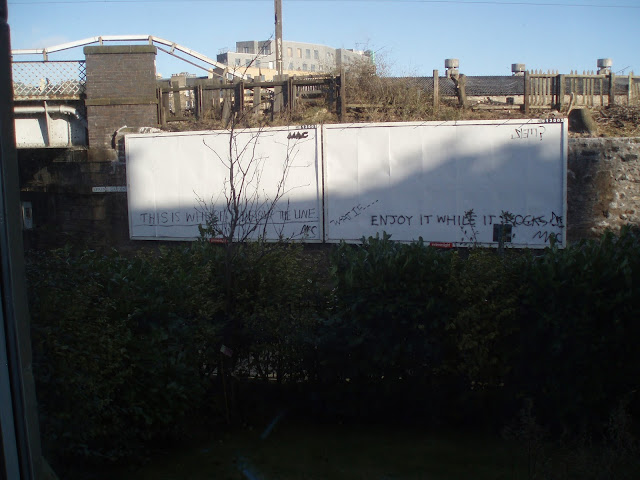The
one and only time I’ve been to Tannadice was in 1954 when the primary 5, 6 and 7 classes of Liff Road School were
taken to the combined Dundee Primary Schools Sports Day to watch the athletics. I imagine the best athletes from our school were
taking part but I don’t recall being told about them. It seems to me now that
in those days we just arrived at places we were taken to with no explanation of
why we were there. It is possible we may have been told about what it all
meant but it’s certainly not something I can recall.
What I do recall on arriving there was noticing that unlike Dens
Park, Tannadice didn’t have a grandstand. It had a ramshackle
pavilion on the southeast corner of the ground. I was distinctly underwhelmed
by the scene and quite understood why Dundee United (who at that time played in
shirts with broad black and white horizontal bands) were only in the ‘B’
division while Dundee were in the ‘A’ division.
Well
things change and both clubs - though no one could have guessed it then - had
famously glorious eras ahead of them. They now have them behind them.
In
1954 it was little wonder to me that Dundee FC, with its pitch long grandstand and, what seemed to me as a 9
years old boy, huge terraces on the other three sides of the park, was
indisputably the city’s elite football club. Having a much grander stadium than
the team down the road was overwhelming evidence of this. In 1953 I had been at Dens Park with my Dad and Grandad
when there were 43,000 spectators in the ground for a Rangers match and it gave me a great deal of
satisfaction that the record crowd at Tannadice was at that time only 26,407.
Moving
on, this past New Year of 2015, over 60
years after my first visit to Tannadice, I decided that with Dundee back
in the Scottish Premier League I would take my wife to see the festive time
local derby at the desert a few yards down from Sandeman Street. Now I say I
had decided to take my wife as if this would be a rare treat for her. It
wasn’t. She hails from slightly warmer climes in the south of England, and
sitting outside on a damp, dreich Dundee afternoon on January 1st does not
immediately come to her mind as being a special treat, but on occasions like
this when my childlike enthusiasm bursts through her tolerance
emerges and she humours me.
With
the decision made to go to Tannadice I ‘phoned the good folk at the ticket
office at Dens Park who are allocated a certain amount of tickets for Dundee fans from Dundee United for the
matches at Tannadice.
"Hello,
ticket office," says a deep, gruff,
Dundee voice.
"I
wanted to go to the United match, and wondered if you’d got any tickets left."
"Eh,
we've a few left."
"Well
can I have two then please ?"
"Eh, well, ye can, but they’re 'restricted view.' "
"How
d'you mean 'restricted view ?' "
"Eh
dinnae ken. Eh dinnae work doon there. Eh work at Dens.”
"So
what do I do? Should I phone them up to find out what 'restricted view' means? "
"Ye
can if ye like."
"Thanks."
A
few minutes later I am listening to a recorded message from a posh, slightly Irish sounding male voice. "Hello there! And a very warm welcome to Tannadice, the home of Dundee
United. If you would like our Commercial Department please press one, if you’d
like our Ticket Department please press two, if you’d like our…."
I
pushed the two on my ‘phone screen.
"Hello,
this is the Dundee United Ticket Office. I’m Alison and how can I help you
today?"
“Well
maybe you won’t want to help me because I support the other side, but I was
speaking with our ticket office this morning and they said they still had a few
tickets for the match on New Year’s Day but they said they were 'restricted view'.
The man didn’t seem to know what that meant so I’ve phoned you up to find out what
‘restricted view’ means before I purchase my tickets."
"Oh!
That’s really a bit naughty. We’ve told your people they shouldn’t really try
to sell those tickets."
"So what does ‘restricted view’ mean ? "
"Basically
it means you can’t see the pitch."
My
wife and I watched the match in the Artisan pub at Abbeyhill in Edinburgh. The
landlord grudgingly agreed to put the match on the smallest of his 4 TV
screens. He really wanted all the screens to show an English Premier League
match.
By
half-time the writing of an unhappy tale was already well on the wall and at the shrill full-time whistle, even with cricked necks aching
from staring at a tiny TV screen situated high up in a corner of the pub, we
were still glad we hadn’t gone to
Tannadice to 'listen' - from our ‘restricted view’ position - to a humiliating 6-2 defeat.
 |
| Restricted view for Dundee fans at Tannadice |
Still
we had more than consolation four months later while sitting in the old main grandstand
at a packed Dens Park - which is a lovable dump of an old stadium - to watch the Famous XI gain its first triumph over United for 10 years. A wonderful occasion not at all marred by a thinnish stanchion which restricted
just some of our view.
 |
| 'Restricted view' Dundee FC style : example of a Dens Park stanchion |






























